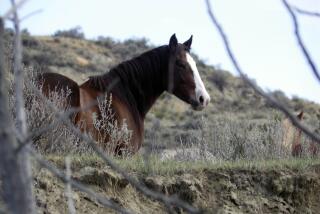Race Is On to Save Rare Russian Horse Species
- Share via
SAN FRANCISCO — Once, they competed for Olympic glory. Now, they battle for survival.
Russian warmbloods, the elegant, coal-black horses that were the foundation stock for the former Soviet Union’s equestrian team, are on the brink of starvation in their changed homeland, and a U.S. humane association has embarked on an ambitious plan to rescue them.
“There are only about 400 of these horses left,” said Luci Christian, president of the Los Altos-based International Equine Humane Assn. “They won’t survive the winter without help. That’s the bottom line, because their hay is running out and they’ve been receiving reduced rations for six months.”
The association hopes to bring up to 150 of the horses to donated land in the San Francisco Bay Area and establish a Russian warmblood breeding center. That would ensure the survival of the species, which dates back 200 years to the days of the Czars.
Christian said the association has been working out details of the rescue with the Russian consul general’s office in San Francisco and Alexander Poloskov, the Russian equestrian team veterinarian whose plea for help began the project.
The association hopes to raise $500,000 to gain title to the horses and pay for their air transport to the United States, while leaving supplies and seed money for the warmbloods’ Russian stock farm to try to ensure better care for those horses left behind.
There are also boarding costs associated with quarantine regulations for horses coming into the United States from overseas.
“The $500,000 is not a lot of money when you consider you’re saving a species,” Christian said. “We have a lot of public support and I think it’s something people want to see happen.
“We’re in a race against time. They’ve already lost quite a few horses. It’s similar to the crisis that we had during the world wars with the Lipizzaner stallions and broodmares. These horses have as much history as the Lipizzaners but have been isolated in Russia.”
Fund-raisers are planned over the next couple of months to finance the association’s mission, and negotiations are under way with two major property owners who may be willing to make room for the Russian warmbloods on their land.
Virtually all of the surviving Russian warmbloods remain at Staroshilovskiy Konnyi Zavod, the former Soviet state stock farm in central Russia, about 180 miles outside Moscow.
Horses produced by the farm include Barin and Dikson, stallions that competed in the last two Olympic games as well as in numerous international dressage and other equestrian competitions.
Barin is still believed to be at the farm. Dikson is believed to be near Moscow under the care of a Russian equestrian team member.
The horses and equestrian team members essentially have been left to fend for themselves since the collapse of communism two years ago and the resulting breakup of the Soviet Union.
Word of deteriorating conditions began filtering out after a May, 1992, visit to the Russian warmbloods stock farm by Shelley Lawder, a Grand Prix dressage rider from Camarillo.
“She was over there and saw that things were starting to fall apart in May, so it started months ago but now it’s down to really desperate straits,” Christian said.
The moribund Russian economy has made it hard on people and animals alike.
Poloskov, in faxes sent to the association, said the scarcity and expense of hay and oats has forced caretakers to slash the horses’ daily feedings by about 50%. Such rationing has been going for the last six months.
The farm also is without such basic supplies as worming paste and veterinary ointments.
“Even if they had them, they couldn’t afford to buy them,” Christian said. “When the average person makes $8 a month to live on, the idea of buying hay or veterinary supplies comes in second, understandably. These horses are quite treasured by the (Russian) people but no matter how treasured they are, they can’t do a thing right now to save them. We can.”
Christian said the rescue will be carried out in stages and an association delegation was expected to leave for Russia in the next two to three weeks to lay the groundwork and assess the condition of the horses.
She said the first phase of the rescue is scheduled for early April, when about 40 horses were expected to be flown out.
To contact the International Equine Humane Assn., call (415) 941-5867.
More to Read
Go beyond the scoreboard
Get the latest on L.A.'s teams in the daily Sports Report newsletter.
You may occasionally receive promotional content from the Los Angeles Times.






